Results
-
 £40.30
£40.30Be Thou My Vision (Wind Band) Traditional arr. Andrew Wainwright
VIEW SCORE PDF A highly evocative arrangement of the popular hymn, also known as Slane. The arranger Andrew Wainwright responds to the ethereal quality of the tune with an exquisite layering of texture. The three-verse setting grows to a glorious climax on the final verse, before dying away to a serene ending. The arrangement was commissioned by the Nebraska Brass Band and its Musical Director Glenn Greet, and it is now available here for wind band. Sheet music available from : UK: www.wind-band-music.co.uk USA: www.solidbrassmusic.com To view a video of Dallas Brass Band performing the brass band version of this work please visit www.youtube.com/watch?v=mUyDYnOkXuE Difficulty Level: Medium Instrumentation: Flute 1-2 Oboe English Horn Bassoon Clarinet in Bb 1-3 Bass Clarinet in Bb Alto Saxophone Tenor Saxophone Baritone Saxophone Trumpet in Bb 1-3 Horn in F 1-4 Trombone 1-2 Bass Trombone Euphonium Tuba Double Bass (optional) Percussion 1-3
In stock: Estimated dispatch 1-3 days
-
 £40.30
£40.30The Huron Carol - Wind Band (Canadian Traditional arr. Andrew Wainwright)
A magical arrangement of the beautiful Canadian Christmas hymn (Canada's oldest Christmas song), which is also known as 'Twas in the Moon of Wintertime. 'In The Huron Carol, Andrew responds to the ethereal quality and wintery mood of Canada's oldest Christmas song, setting this beautifully simple tune in an ambiguous, Downie-Himes inspired landscape. The layering of texture is magical.' Paul Hindmarsh - Music critic To view a performance of the work please visit: https://www.youtube.com/watch?v=gB7DhDTWBCA (please note the performance is of the brass band version). PDF download includes score and full set of parts. Sheet music available from : UK: www.wind-band-music.co.uk USA: www.solidbrassmusic.com Difficulty Level: Medium Instrumentation: Piccolo Flute 1-2 Oboe Bassoon Clarinet in Bb 1-3 Bass Clarinet in Bb Alto Saxophone Tenor Saxophone Baritone Saxophone Trumpet in Bb 1-3 Horn in F 1-4 Trombone 1-2 Bass Trombone Euphonium Tuba Double Bass Timpani Suspended Cymbal Triangle
In stock: Estimated dispatch 1-3 days
-
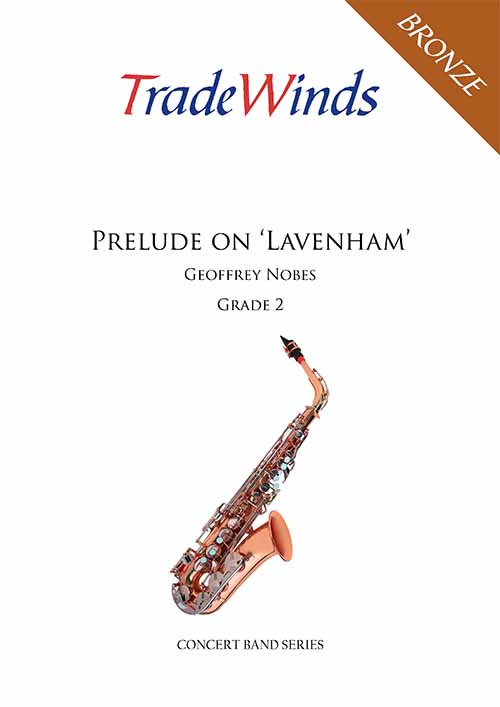 £29.95
£29.95Prelude on 'Lavenham' (Concert Band - Score and Parts) - Nobes, Geoffrey
Prelude on 'Lavenham' was written for the 130th anniversary, in 2014, of Lavenham Corps in Suffolk and was first performed at their anniversary concert in the village's beautiful Parish Church by Kettering Citadel Band. It's an arrangement of a tune the composer wrote to the words, 'Lord, there are times', a lovely hymn by the Reverend Nick Fawcett. The arrangement is dedicated to the memory of Bandmaster Derek Wilding of Lavenham Corps.The music is serene and free-flowing and was written with the rich and warm acoustics of the lovely medieval church very much in mind. It should be played cantabile throughout, with close attention to contrasts in dynamics.
Estimated dispatch 7-14 working days
-
 £5.95
£5.95Prelude on 'Lavenham' (Concert Band - Score only) - Nobes, Geoffrey
Prelude on 'Lavenham' was written for the 130th anniversary, in 2014, of Lavenham Corps in Suffolk and was first performed at their anniversary concert in the village's beautiful Parish Church by Kettering Citadel Band. It's an arrangement of a tune the composer wrote to the words, 'Lord, there are times', a lovely hymn by the Reverend Nick Fawcett. The arrangement is dedicated to the memory of Bandmaster Derek Wilding of Lavenham Corps.The music is serene and free-flowing and was written with the rich and warm acoustics of the lovely medieval church very much in mind. It should be played cantabile throughout, with close attention to contrasts in dynamics.
Estimated dispatch 7-14 working days
-
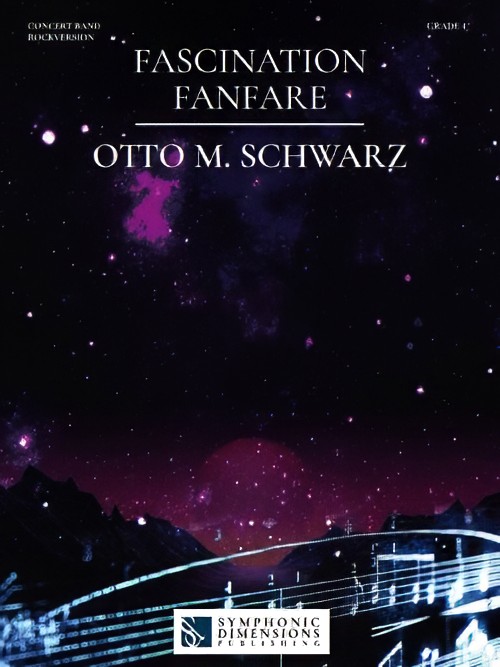 £100.80
£100.80Fascination Fanfare (Concert Band - Score and Parts) - Schwarz, Otto M.
Rock VersionFascination Fanfare is a hymn to passion, to fascination and to generations of music lovers! This dynamic fanfare is a rousing work full of catchy melodies and enthralling sounds. This opening work and the musical signature tune it contains were commissioned by the Austrian Brass Band Association and will be heard, among other things, at public events as a musical calling card.Duration: 3.15
Estimated dispatch 7-14 working days
-
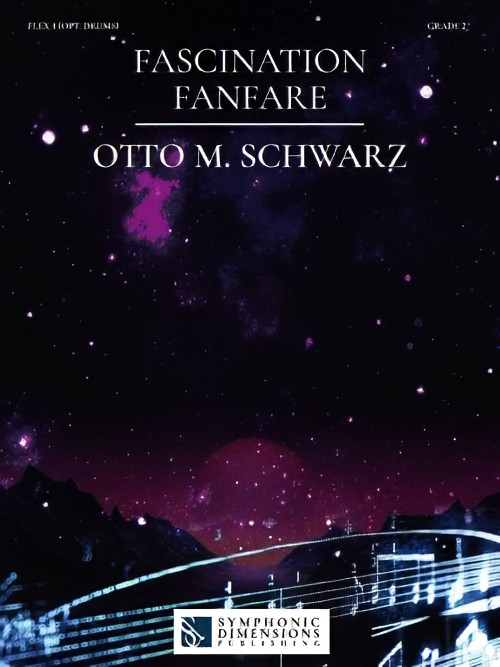 £63.99
£63.99Fascination Fanfare (Flexible Ensemble - Score and Parts) - Schwarz, Otto M.
Fascination Fanfare is a hymn to passion, to fascination and to generations of music lovers! This dynamic fanfare is a rousing work full of catchy melodies and enthralling sounds. This opening work and the musical signature tune it contains were commissioned by the Austrian Brass Band Association and will be heard, among other things, at public events as a musical calling card.Duration: 3.00
Estimated dispatch 7-14 working days
-
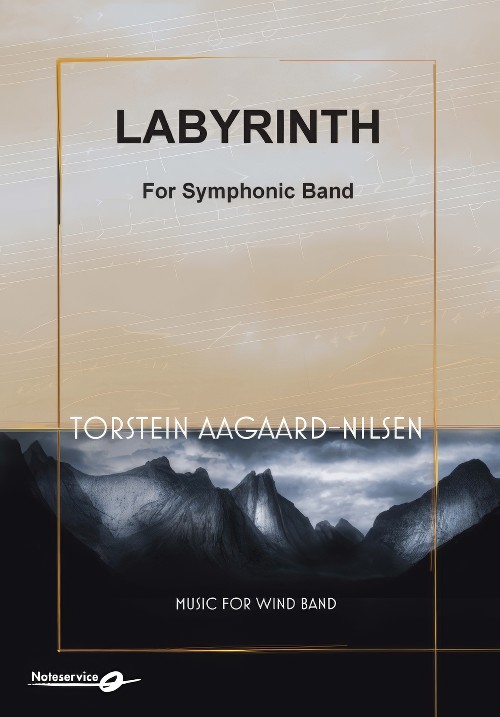 £242.50
£242.50Labyrinth for Symphonic Band (Concert Band - Score and Parts) - Aagaard-Nilsen, Torstein
I wrote Labyrinth to celebrate the 450th anniversary for the city of Fredrikstad. The Danish king Fredrik II agreed to establish a new town further down the river Glomma, to make it easier to defend from the Swedes. The piece is a network of quotations mixed with my own pitch material. My versions of the quoted melodies are not authentic, and sometimes hard to recognize. However, the different quotations give the music an aura of tonality. For example, a dance tune composed by the Flemish composer Mattheus Le Maistre (1505-1577). The melody also occurs in the first danish book of hymns written after the reformation. Since Norway for 400 years was a part of Denmark and everybody had to write and read Danish, they used much of the same music, too. I also use regular Danish hymn tunes and quote from a religious folk song from the area around Fredrikstad. The military signals I use are authentic (for example, The Old Danish March), and I am very sure they were used in the Old Town (the fortress) of Fredrikstad. The drums quote from The Downfall of Paris. This could have been heard played by professional soldiers hired by the Swedes from Scotland. This edition is a revised version made in 2020. - Torstein Aagaard-Nilsen. Duration: 23.00
Estimated dispatch 7-14 working days
-
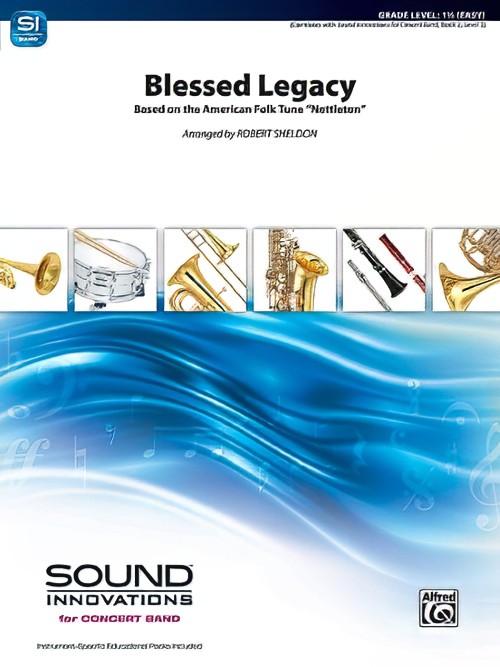 £52.95
£52.95Blessed Legacy (Concert Band - Score and Parts) - Sheldon, Robert
The American folk tune Nettleton, first appeared in a collection of sacred music published in 1813, compiled by John Wyeth, who is sometimes listed as the composer. The melody is most often associated with the hymn, Come Thou Fount of Every Blessing.
Estimated dispatch 7-14 working days
-
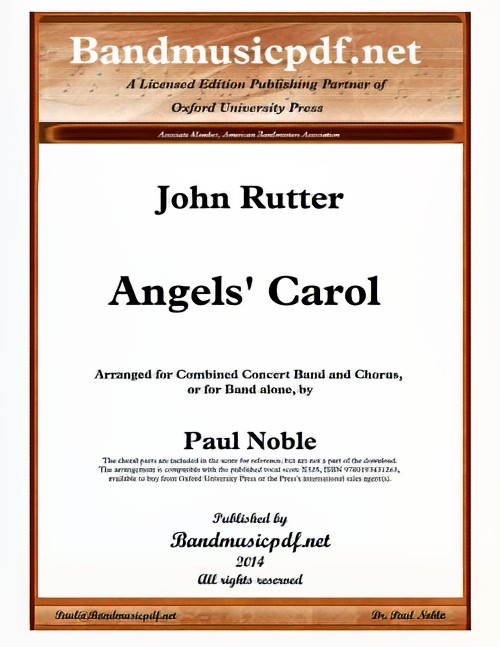 £75.00
£75.00Angels' Carol (Concert Band with Optional Choir - Score and Parts) - Rutter, John - Noble, Paul
The music was adapted and arranged by Lowell Mason in 1839 from an older melody which was then believed to have originated from Handel, not least because the theme of the refrain (And heaven and nature sing...) appears in the orchestra opening and accompaniment of the recitative Comfort Ye from Handel's Messiah, and the first four notes match the beginning of the choruses Lift up your heads and Glory to God from the same oratorio. However, Handel did not compose the entire tune. As of the late 20th century, Joy to the World was the most-published Christmas hymn in North America.
Estimated dispatch 7-14 working days
-
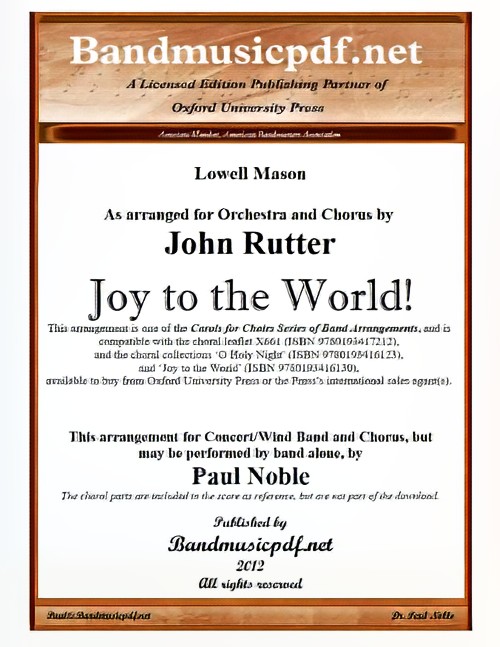 £75.00
£75.00Joy to the World (Concert Band with Optional Choir - Score and Parts) - Mason, Lowell - Noble & Rutter
The music was adapted and arranged by Lowell Mason in 1839 from an older melody which was then believed to have originated from Handel, not least because the theme of the refrain (And heaven and nature sing...) appears in the orchestra opening and accompaniment of the recitative Comfort Ye from Handel's Messiah, and the first four notes match the beginning of the choruses Lift up your heads and Glory to God from the same oratorio. However, Handel did not compose the entire tune. As of the late 20th century, Joy to the World was the most-published Christmas hymn in North America.
Estimated dispatch 7-14 working days
